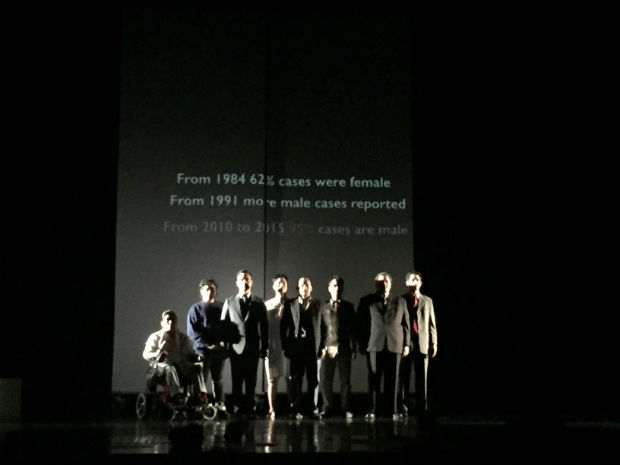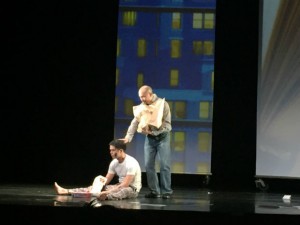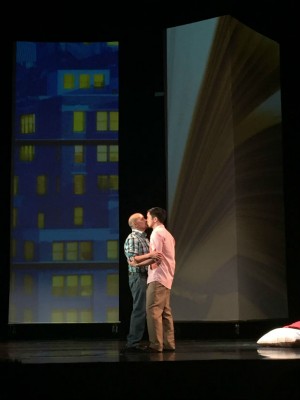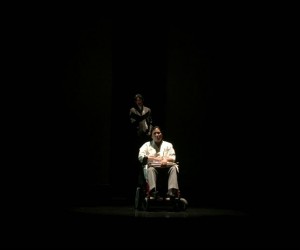REVIEW: In ‘Normal Heart,’ war against HIV rages on
The setting is New York City, 1981. The gay sexual liberation is at its peak. Love is accepted, defined. But fear, too, is widespread, like the virus that kills a specific segment of society – the gay community. The ‘80s was the time when the AIDS epidemic was not known as it is now, but as the “fringe disease,” or “gay virus.”
Enter Ned Weeks, an outspoken, abrasive gay man whose tendency is to argue in anger than negotiate diplomatically. He witnesses the death of a close friend due to the mysterious disease that pockmarks the subject with black spots, before weakening his immune system and eventually killing him. Ned meets a female doctor who took it her mission to study the epidemic that is killing gay men by the dozens daily. Ned is chosen, too, as the representative for Dr. Emma Brookner to convince the gay community to stop having sex to curb the spread of the disease – easy to say, but difficult to do in a period when gay liberation is celebrated in sex.
This is the story of “The Normal Heart” the play of renowned gay activist Larry Kramer, which takes stage at the RCBC Plaza, Makati, this weekend. The setting gives away the dark subject that provokes more than enlightens the audience about the gay liberation in New York in the ’80s. The stage is simple – dark, with projected images of hallways and room spaces. The transition score is disconcerting – a heartbeat that slows down to an eerie silence before the next scene takes place. The play starts off with a projected image of red blood cells, a stark metaphor for the virus that no one knew at the time was spread through blood contact or sex.
Bart Guingona directs and leads the play about the AIDS (acquired immune deficiency syndrome) epidemic in the United States which he says resonates even today in modern Philippines.
HIV cases in the country has been increasing since the start of the millennium – from just 1,450 people living with HIV (human immunodeficiency virus) in 2000 to 22,527 in 2014, according the Department of Health (DOH) registry. As of Feb. 2015, DOH noted that at least 20 HIV cases are diagnosed daily. Almost half of all the cases recorded since 1984 were among the gay community. HIV leads to AIDS, the victim of which suffers deteriorating immunity from illnesses.
Article continues after this advertisement“You have to look at it as a history lesson. It’s the first time AIDS was discovered in the US. The way we are dealing with the epidemic in our country now echoes so much on what happened in New York in 1981. Didn’t we get a little wiser?” Guingona says in a briefing after the play.
Article continues after this advertisementA representative of people living with HIV graced the stage during the briefing – Elena Felix from Pinoy Plus Association, who has been living with HIV since 1994. Felix says the story reflects the discrimination that haunts people with HIV.
“Kung ito ay nangyari nung 1980s, nangyayari pa rin hanggang ngayon ang stigma at diskriminasyon na nararanasan namin ngayon,” Felix says. She recounts an instance when she had to be operated in the hospital shamed with a poster that read “universal precaution.”
“Iilan lang kaming malakas ang loob na lumabas at sabihing ako ay HIV-positive. May dignidad pa rin kami. Mayroon lang kaming sa katawan, pero mayroon pa rin kaming buhay,” Felix says.
In the play, Ned organizes a group of gay men to convince an apathetic government for research funding for the mysterious disease. But his confrontational manner of dealing with the cause leads to the ruin of their collegiality within the organization, especially Ned’s friendship with their president, Bruce Niles, a closeted investment banker whose silent and patient demeanor fails to rouse the community on the spread of the disease through promiscuity.
The character of Ned is wonderfully portrayed by the director, seasoned actor Guingona, who hits the spot as the loudmouthed and abrasive Ned. Mainstream actor TJ Trinidad provides a famous face onstage, not as immense in acting as the others, but consistent with his character Bruce’s brooding, reflective closeted nature. The scene that stands out between the two is when Bruce informs Ned of the death of the former’s lover, the body stowed away in a body bag and treated like an infected corpse.
The story likewise takes on family values as the relationship fails between Ned and his lawyer brother Ben, played by Richard Cunanan who gives a straight man’s perspective to the story. A stubborn Ned is infuriated that his brother is more concerned about the construction of his new house than helping his organization. Ben admits that he still could not understand why the gay lifestyle is of promiscuity. Ned vows never to talk to Ben again until he considers him an equal.
Eventually, Ned’s cause falls on deaf ears. Dr. Emma is refused the funding she needs for her research. In the most tense scene of the play, Dr. Emma, portrayed by the superb Rosalyn Perez, screams in hopelessness as she was rejected support to continue her study. “Take it,” she tells the doctors’ panel in contained frustration as she throws to the floor the papers of her work, before losing it: “Take it! We are facing an epidemic of death!”
“If you look at the stage, it’s a war zone. It was a war, and unfortunately, it’s a war that is lost during the time,” Guingona says.
Guingona adds that the situation is further marred by the fact that the sector affected by the virus has long been discriminated against in the fringes. “(The government) didn’t want to deal with something that is ravaging a community they didn’t care very much (about).”
The story ends in a hopeless note. Ned loses his lover, Felix, played by the charming Topper Fabregas, who before his death visits Ben to make his final will – a beachfront property for Ned. They get married, even only symbolic, in the hospital, until Felix expires from the condition. Ned’s spirit hit its lowest. “I didn’t fight enough,” Ned says, blaming himself for Felix’s death.
In perhaps a most haunting closing to the play, the cast lined up on the stage in dim light, its backdrop the rising statistics of the HIV/AIDS in the Philippines – one newly diagnosed case daily in 2008, four in 2010, nine in 2012, 17 in 2014, 20 as of late this year. Victims as young as 14 years old. Victims mostly gay men. The silence deafening, until the stage turns to black. No resolution, no end to the unabated spread of the epidemic.
Guingona says the play is a cautionary tale for the Philippines, which continues to wage the war against HIV/AIDS three decades since New York fought the battle. “It is important that the war that is ongoing be fought by the new generation of people who care.”
“This has happened before. Didn’t we learn at all?” he adds.
“The Normal Heart” runs July 3 to 5 (Friday, 8 p.m.; Saturday/Saturday, 3:30 p.m. and 8 p.m.) at the Carlos P. Romulo Auditorium, RCBC Plaza. For tickets, call TicketWorld 8919999.



